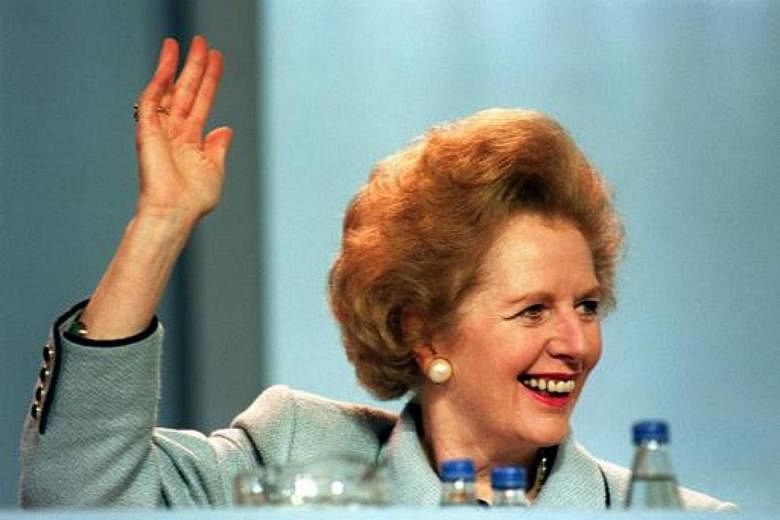LONDON (BLOOMBERG) - Former British Prime Minister Alec Douglas-Home wasn't told that one of the Queen's aides had confessed to being a Soviet agent because his Home Secretary did not want to "add to his burden," according newly released files.
The revelation is contained in previously secret documents released on Tuesday (July 24) at the National Archives in London. Other files deal with Margaret Thatcher's habit of falling asleep in cars and the way her office prepared for the election of her successor.
In 1964, after years under suspicion, Anthony Blunt, a former officer for the Security Service MI5, confessed that he passed documents to the KGB during the war. By this time he was a leading art historian, looking after Queen Elizabeth II's collection in his role as Surveyor of the Queen's Pictures.
But the UK government was already reeling from the unmasking of the "Cambridge Spy Ring,'' a group who had been recruited by the Soviets while at university and had gone on to penetrate the highest levels of British intelligence. It didn't want to admit that it had found another member, so Blunt was offered immunity from prosecution - and protection from public exposure - in return for a full confession.
PALACE SECRET
The Palace was told about Blunt's treachery, but was asked to keep him in place so as not to arouse suspicion. Home Secretary Henry Brooke decided not to tell Douglas-Home.
He may have wanted to avoid putting the prime minister in a position where he felt obliged to tell lawmakers from the opposition Labour Party about the scandal.
It wasn't until 1979 that Blunt was publicly named as a Soviet agent, when details of his role were published in a book. Thatcher confirmed it to Parliament, but her revelation that Douglas-Home had been unaware of the confession was greeted with astonishment.
'WELL-MEANT EFFORT'
After Thatcher's statement Brooke sent her a letter. "I have written to Alec to explain why in April 1964 I did not bring him in on what was happening about Blunt," he said. "And to say how sorry I am if in my well-meant effort not to add to his burden I may, with hindsight, have exercised my discretion wrongly."
Some of the files have a contemporary echo.
Theresa May, trying to fend off anti-European attacks from Conservative lawmaker Jacob Rees-Mogg, won't be surprised to learn that Rees-Mogg's father, William, caused problems for one of her predecessors, John Major.
In 1993, Rees-Mogg senior went to court to try to stop Britain from ratifying the treaty that created the European Union. When he lost his case, Major was delighted. "Good," he wrote. "A full gloat is merited."
The files also show how both Conservative and Labour governments, concerned by the threat of communism, supported propaganda operations and urged MI5 to focus on suspected subversives in trades unions and the media.
In 1969, Labour Home Secretary James Callaghan, despite or perhaps because of his party's close links to organised labour, asked officials to look at ways that left-wing union leaders could be ousted, possibly by leaking stories to the press.
A decade and a half later, Thatcher asked security officials to investigate whether left-wingers were trying to infiltrate the civil service.
Meanwhile, for three decades after the end of World War II, the British Foreign Office ran a secret propaganda section, the "Information Research Department (IRD)," which aimed to provide information about the evils of communism abroad and at home and briefed selected journalists.
The diplomats decided their best chance of being convincing was if their reports were trustworthy. The US television journalist Edward Murrow was among those who admired the IRD's briefings.
THATCHER NAPS
While Thatcher is famous for having got by on four hours of sleep a night, less well-known is her habit of catching up by napping on car journeys. It happened so often that her office asked for a specially designed headrest for her Daimler, to protect her neck if the car braked suddenly while she was dozing.
When Thatcher was finally ousted in 1990, her office began preparing for her successor. There were three candidates: Chancellor of the Exchequer John Major, Foreign Secretary Douglas Hurd, and the man who brought Thatcher down, Michael Heseltine.
A folder was prepared for each of them. Now public for the first time, they contain details of how the new prime minister should behave upon being invited to meet the Queen at Buckingham Palace, what government posts they would need to fill, and what urgent policy decisions they faced.
The first folder prepared was for Heseltine, a former Defence Secretary who had long been considered a likely successor to Thatcher. The Hurd and Major folders were then based on that, with variations reflecting their different situations. But Conservative lawmakers had different ideas from the officials: They went for Major as the compromise candidate.
And the Heseltine folder? It was filed away, a two-word scrawl at the top of the first page marking the end of his attempt to reach the summit of British politics: "Not needed."

